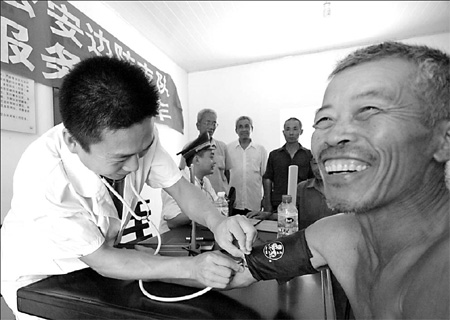Aging seniors facing life without proper care
More children leaving 'empty nests' for parents to cope alone.
Li Xiuqin, 56, has been exercising every morning since her retirement.
She does it not only for fun but to stay healthy. The retired school teacher lives with her husband, also retired, in Xianyang of Shaanxi province.
|
|
|
A People's Liberation Army medical worker measures the blood pressure of a senior in Taizhou of Zhejiang province in this file photo. |
Their only daughter, born around 1980 when the family planning policy went into effect, however, works in Shanghai, the country's business hub.
Still struggling with high living expenses in the city, particularly for housing, her daughter cannot afford to have her parents live with her in Shanghai.
As the first generation of parents affected by the one-child policy reach their 60s, they face great challenges in senior care, particularly for so-called "empty nest" parents like Li and her husband.
Official statistics show nearly 80 million seniors aged 60 and over in China now live in empty nests with no children by their sides to take care of them.
Despite a well-off life in her hometown, Li said she misses her daughter, who comes back to visit twice a year.
Worse, the difficulties of aging, like medical care and poorer health, loom as "my husband and I become older and older", Li said.
"Maybe life today is easier and richer than my parents' time but I don't think I will be as lucky as them, who always had children around taking care of them," she said.
The tradition that grown-up children take care of aged parents in big families with multiple children is vanishing today, particularly in cities where a couple is limited to one child, experts said.
People older than 60 numbered 169 million in China at the end of 2008, accounting for 13 percent of the population, much higher than the United Nations' threshold of 10 percent for an aging society.
Among them nearly half, 49.8 percent, live in empty nests.
In rural areas, some, in spite of their age, even have to take care of grandchildren as their children often leave for cities seeking better employment.
However, about a quarter of the seniors, about 30 million, will become disabled due to disease or age and need long-term care, Yan Qingchun, deputy director of the China National Committee on Aging (CNCA) office, said at the Second China Summit Forum on Aging and Services last week.
"For them, living in a professional nursing home might be the best choice," he said.
However, China now has about 40,000 such facilities with nearly 2.4 million beds, official statistics showed.
A latest survey conducted by CNCA showed only 10 percent of urban seniors are willing to live in a nursing home.
"Surely I'd be happier living with my daughter," Li said.
However, she would have to overcome potential problems.
"It wouldn't be easy for me to adapt to a new environment in Shanghai," she said.
"And my medical insurance works only in my hometown."
 0 Comments
0 Comments







